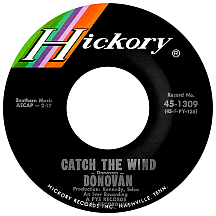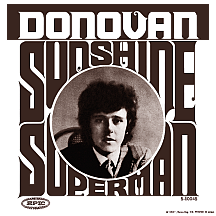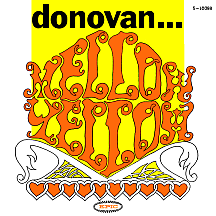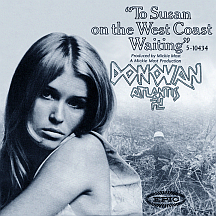DONOVAN
Deeply personal, often indecipherable lyrics are the rule rather than the exception for Scottish songsmith Donovan Philips Leitch; meanings found in his songs (ranging from persuasive social commentary to cleverly-rhymed conundrums) vary greatly according to each person's point of view. From lines like 'Thrown like a star in my vast sleep' (from "Hurdy Gurdy Man"), one might suspect he purposely solicited a certain degree of bewilderment. Entertaining art at the very least, his musical output over a four-year period in the latter half of the 1960s is abundant with mysterious imagery.
The Glasgow-born adolescent lived in Hatfield, Hertfordshire, England starting in the mid-1950s, becoming interested in folk music as it blossomed later in the decade. Heading south to St. Albans and later Cornwall, north of London, he made the rounds using the singular name Donovan, performing folk music with a kazoo-playing friend from Hatfield, David Mills, who went by the nickname "Gypsy Dave." In 1964, the 18-year-old Donovan caught the eye of songwriter Geoffrey Stephens and his business partner Peter Eden and they began representing him; an audition tape was sent to Elkan Allan of Ready Steady Go!, leading to three consecutive February '65 appearances on the highly influential TV series. A contract with Pye records resulted; Leitch wrote his own material, singing and playing acoustic guitar on most of the tracks he recorded.
"Catch the Wind" ('To feel you all around me and to take your hand along the sand...ah, but I may as well try and catch the wind...') was written for Linda Lawrence, a young woman in a relationship at the time with Brian Jones of The Rolling Stones (Donovan had met the band shortly after his star began to rise); the single hit the U.K. top ten within weeks of the RSG shows and remained there through most of April and May, impacting the U.S. top 40 in June. Donovan has admitted many of his compositions were inspired by the initally-unattainable Linda, including the second hit, "Colours" ('Yellow is the color of my true love's hair, in the mornin'...when we rise...that's the time I love the best'), a British top ten that summer.
Donovan composed all but one of his hit songs; "Universal Soldier" has been described by composer Buffy Sainte-Marie (a politically active folk singer from Saskatchewan, Canada) as a symbol for "...the personal responsibility of all," be they soldiers, politicians or civilians. A U.S.-only single, it competed for airplay in the fall of '65 with a version by Glen Campbell. Pye chose to issue another romantic musing, "Turquoise," in its place. Writers began comparing him to Bob Dylan, who'd broken through at about the same time, in futile attempts to stir up some sort of competitive resentment between the two, ignoring the notion that the folk categorization was the only thing they had in common. Bob and Donovan met, developed a friendly rapport and quashed all notions of a rivalry.
The Big T.N.T. Show, an American International concert film (and sequel to late '64's T.A.M.I. Show), kicked off 1966. Headed by hot current acts including The Lovin' Spoonful and The Byrds, it had been staged at a Los Angeles nightclub in November '65 and provided Donovan with more than his share of screen time. "Universal Soldier" and "Summer Day Reflection Song" were two of the four numbers he performed. Already the singer was undergoing a transformation in music and image; Mickie Most, the notoriously difficult-to-work-with producer behind smash hits by The Animals, Herman's Hermits and The Nashville Teens, began working with Donovan...and that's when it all took a trippy turn. The "flower child" image worked better for him commercially than the folk image had...not that fortune and fame was necessarily first among Donovan's priorities. But it was Mickie's main goal.
The friendship between Linda and Donovan had developed into a short-lived romance and the abstract "Sunshine Superman" came about as a personal reaction to their breakup (he moved on, dating Lolita actress Sue Lyon for a time). Few could guess at the song's intended meaning, though, with lines like 'Everybody's hustlin' just to have a little scene' designed to dumbfound fans; for all the adolescent geeks/future world leaders, the acknowledgement of super hero faves Superman and (especially) Green Lantern was thrill enough...attempts to decipher the lyrics would come later. Released in the U.S. first on Epic, the record soared to number one in September '66; back in D.L.'s stomping grounds its release was delayed (due to some manager's-musical-chairs legal entanglements) and it appeared in December, peaking at number two behind British Isles monster "Green, Green Grass of Home," Tom Jones the culprit who deprived Donovan of a chart-topper on his home turf.
The Beatles' "Yellow Submarine" appeared side-by-side with "Sunshine Superman" in the U.S. top five, worthy of mention for Donovan's contribution to the sing-along chorus and a few words in the lyrics. Paul McCartney, in turn, whispered on Leitch's next single, "Mellow Yellow," the infamous 'electrical banana' let's-get-high false alarm that sparked a brief dried banana peel smoking craze; a number two American hit in December 1966, it drew belated breath in the U.K. top ten in February '67. Three hits that year contrasted everything else on the airwaves: "Epistle to Dippy" ('...looking through crystal spec-ti-cles...') was about a close friend stationed overseas in the British Army, "There is a Mountain" ('...then there is no mountain...then there is...') was based on a Zen proverb and featured flute playing by noted Jamaican jazz musician Harold McNair, and "Wear Your Love Like Heaven," spiritually far-out in its own right, was later heard on a series of TV commercials for Love's Cosmetics.
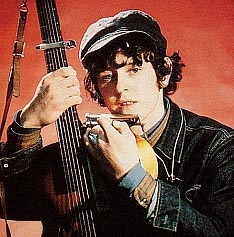
Poor Cow, a late '67 British film starring Carol White and Terence Stamp, featured several songs by Donovan including the title track (originally titled "Poor Love"). "Jennifer Juniper" (it would appear Linda's replacement had arrived?) was a hit in spring '68, then "Hurdy Gurdy Man," the hardest-rocking track thus far, became Donovan's biggest hit in well over a year. John Paul Jones (who would soon be part of the Led Zeppelin phenomenon) played bass on the track while Donovan manned the tambura; the truly unique recording went top five in the U.S. and U.K. in the summer of '68. Follow-up "Lalena" ('...can your part get much sadder?') got its title and essence from actress Lotte Lenya's role in the 1956 version of the stage play The Threepenny Opera.
Early 1969 hit "To Susan on the West Coast Waiting" referenced the Vietnam war but centered on lovers separated as a result of the conflict, thus avoiding any pro or con statement; its flip side offered a long, romanticized spoken introduction about the myth of the long-lost underwater nation "Atlantis" ('...'way down below the ocean...where I wanna be, she may be') and became his fourth U.S. top ten in May, just as ensemble comedy If It's Tuesday, This Must Be Belgium was in theaters; he performed in and composed the title song for the film. "Goo Goo Barabajagal (Love is Hot)," with The Jeff Beck Group supplying the rocking rhythm, put forth the most convoluted lyrics to that point, providing a fabulous puzzle-with-no-solution for joyously perplexed fans.
Speaking of joyous things, Donovan and Linda were married in 1970 and she has remained inspiration for many of his lyrical works. A few hits emerged as his peak years waned in the early 1970s. That 'Mongoose is gone' song, "Riki Tiki Tavi," made a social statement out of a segment in Rudyard Kipling's 1894 classic The Jungle Book. "Celia of the Seals" was created as an endorsement of the work of Celia Hammond, a former model who became a spokesperson for animal rights. He had a role in the 1972 British film The Pied Piper and made an appearance in 1978's big budget box office bomb Sgt. Pepper's Lonely Hearts Club Band starring The Bee Gees and Peter Frampton. Since then, Donovan has recorded and performed consistently, though at a slower, more structured pace since he and Linda settled into a quieter life in the south of Ireland.
NOTABLE SINGLES:
- Catch the Wind - 1965
- Colours - 1965
- Universal Soldier - 1965
- Turquoise /
To Try For the Sun - 1965 - Sunshine Superman - 1966
- Hey Gyp (Dig the Slowness) - 1966
- Mellow Yellow - 1966
- Epistle to Dippy - 1967
- Summer Day Reflection Song - 1967
- There is a Mountain - 1967
- Wear Your Love Like Heaven - 1967
- Jennifer Juniper - 1968
- Hurdy Gurdy Man - 1968
- Lalena - 1968
- To Susan on the West Coast Waiting /
Atlantis - 1969 - Goo Goo Barabajagal (Love is Hot) - 1969
with the Jeff Beck Group - Riki Tiki Tavi - 1970
- Celia of the Seals - 1971
- I Like You - 1973
- Maria Magenta - 1973


